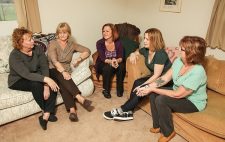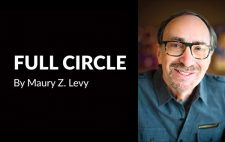The battles were waged by men and boys, but it was women who watched World War II unfold. Many went to work serving their country from military bases, factories and hospitals to USO dance halls and farm fields. Most were far from the front lines, but their experiences offer a unique perspective on the patriotism, loss and fear of the war years.
Many of those experiences are documented in “New Jersey Women in World War II,” a new book by historian and Stockton University professor Patricia Chappine. She mined the archives of historical societies and universities around the state, collecting the memories of real-life “Rosie the Riveters,” nurses and female veterans. Chappine says she was shocked by the range of jobs and responsibilities women took on, and even more surprised by the reaction many had when she asked them about their service.
“For some reason so many feel like they didn’t do enough or they didn’t do a lot,” she says. “They’ll say things like, ‘Oh, I didn’t do anything special.’ You have to convince them that, ‘Yes, you did, and people want to hear about it.’”
It’s important to document these experiences, Chappine says, because while their war was very different from the wars we’re fighting today, these women paved the way for those who currently serve our country.
“The war, for them, was everything,” Chappine says. “We’re at war right now too, but it’s easy to forget. We’re not collecting blood donations and having food and gasoline rationed. We’re not being inconvenienced at all. If you don’t have anyone in the service, it doesn’t really affect your daily life and you can almost forget we’re involved in a conflict. They couldn’t forget. They did everything to support the war effort, and if they hadn’t stepped up, there wouldn’t be women graduating Ranger School today.”
Chappine’s book contains information from hours of recorded interviews, many of them from women who have since passed away. But there are a handful still living in South Jersey, and their stories, each told from a very different perspective, offer a firsthand glimpse into the war that changed the world.
 Pat Witt, 89
Pat Witt, 89
Pat Witt was born and raised in Millville, on a farm just across the river from the Army Air Field where thousands of men were stationed during the war. While Millville’s hometownboys were shipped off to faraway bases and the battlefields of Europe and the Pacific, Witt vividly remembers the many – and remarkable – responsibilities shouldered by the girls and women who stayed behind.
“The war was so close to us here along the coast,” she says. “We all expected to be bombed at any moment. We had constant air raid drills and blackouts. Even the streetlights were put out. All along the Shore, everything was dark. There were rumors that there were enemy submarines right off the coast. It was scary; absolutely terrifying, really.”
Witt’s mother was trained as a plane spotter, and Witt would often accompany her to her post, where she watched and listened for bombers that could wreak havoc on the South Jersey coastline.
“It was something a lot of women around here were trained to do,” Witt says. “She’d go out at night and work a four-hour shift. She sat on this platform and listened to the planes flying overhead.
She could tell from the sound of the engine what type of plane it was. They had a phone hooked up, and she’d call it in.”
Witt made contributions big and small to the war effort.
She spent hours at the T.C. Wheaton Glass Factory, working alongside the wives of men stationed at the Air Field to hand-paint thousands of tiny glass components destined for radios and radar equipment. She folded bandages for the Red Cross and knitted scarves, hats, socks and gloves for the troops from Army-issued khaki wool yarn. Even her haircut was patriotic.
“My mother heard they were asking people to donate hair,” she says. “They used it to make rifle sights. I hated short hair, but she took me to the barber, and we had my long braids cut off to give to the war effort.”
Witt also joined the local USO, dedicating her time to entertaining the soldiers and distracting them from the grim realities of war.
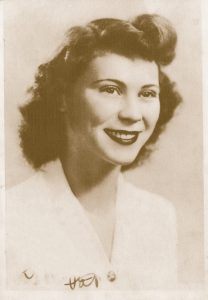 “Even though I was only 17 – and really you had to be 18 – the soldiers all voted for me to join the USO,” she says. “I guess I was an outgoing person, full of laughter, and they liked that. We spent time with the soldiers, having a good time. They’d fly in big bands, and we’d have a formal dance at least once a month. We had big picnics and barbeques on the beach. These were all morale-building things.”
“Even though I was only 17 – and really you had to be 18 – the soldiers all voted for me to join the USO,” she says. “I guess I was an outgoing person, full of laughter, and they liked that. We spent time with the soldiers, having a good time. They’d fly in big bands, and we’d have a formal dance at least once a month. We had big picnics and barbeques on the beach. These were all morale-building things.”
At the USO, Witt met Bill Witt, the man who would become her husband.
“I was 18 and going to art school at the Philadelphia Museum School [now University of the Arts], and he was getting ready to go overseas,” she says.
“He wanted to get married before he left, so we got on a troop train to Maryland to get married. The train was full of soldiers and brides-to-be – I mean hundreds of couples. When we got off there were taxis lined up and drivers calling, ‘Jewish! Baptist! Catholic!’ They’d take you to the right officiant and then bring you back to the station.”
When the war ended, Witt left art school and moved to her new husband’s hometown in Georgia.
“He wanted to move back home, and I went with him but I hated it down South,” she says. “Plus, he lied to me; he said he loved art and loved museums, but it wasn’t true. Art is a jealous mistress, and he wanted me all to himself. I couldn’t give up my art.”
Pat came back to South Jersey with her two daughters and purchased a ramshackle barn in Millville that she transformed into the Barn Studio of Art, which has thrived as a haven for art students young and old for the past 55 years. Today Witt is the artist laureate of Millville, and despite the macular degeneration that’s left her nearly blind, she still paints sweeping South Jersey marshland landscapes from memory.
 May Brill, 91
May Brill, 91
Growing up in South Philadelphia, May Brill loved school. But as one of seven children in a family that was less than affluent, she knew college was a pipe dream. After Pearl Harbor, her focus shifted from schoolwork to service, and she joined the Naval Reserve’s Women Accepted for Volunteer Emergency Service (WAVES).
“My brothers enlisted – one in the Army and one in the Coast Guard – and I thought, ‘It’s my country too,’” Brill says. “My mother was very independent, and I guess I take after her.
I was sworn into the WAVES in 1944 on my 20th birthday.”
Brill was sent to Hunter College in the Bronx, New York, where she completed the same advanced training as the male recruits. She was selected to receive additional training at the Georgia State College for Women, where she learned the skills to serve in the Navy Supply Corps.
“I’d never been outside of Pennsylvania, except to go to Atlantic City,” she says. “They told me I was going to be stationed close to home, but in the end they sent me all the way across the country to Oakland, California.”
Brill was tasked with tracking the needs of the U.S. fleet in the Pacific and supplying them with equipment, tools, medical supplies and food.
“We supplied the entire Pacific fleet. Every ship and base was full of men who needed all of these things to survive,” she says. “The women did their jobs right alongside the men.”
When she first arrived in Oakland, it wasn’t her gender that set her apart from the others who were stationed there, Brill says, but her heritage. She was one of just nine Jewish women from the East Coast who were part of the Supply Corps.
“We met a lot of people who’d never seen a Jew in their whole lives,” Brill says. “There were misconceptions and a lot of prejudice. Kids were taught by their parents these prejudices against Jewish people, but we said, ‘Look, we’re just like you.’ They learned we weren’t any different, and after a while the prejudice faded.”
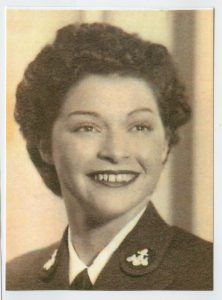 Brill was discharged from the WAVES in 1946 and headed back to school as soon as she got home.
Brill was discharged from the WAVES in 1946 and headed back to school as soon as she got home.
“When I came out my whole life changed,” she says. “Suddenly college was an option for me. I was standing in line to register for classes at Temple University when I met a girl who introduced me to my future husband. I was married to him for 39 years.”
When the youngest of the couple’s four daughters went to school, Brill’s husband encouraged her to return to college for an advanced degree. She went to Rowan – then Glassboro State College – to study human sciences and gerontology.
Though it’s been 70 years since she was discharged, the longtime Cherry Hill resident continues to serve her country as the Senior Vice Commander of Jewish War Veterans Post 126. She frequently speaks to students and adults about the history of women in the military and has traveled to Washington, D.C., to advocate for the needs of female veterans.
“I always say, ‘A woman’s job is never done.’ I go around speaking about what we did during the war. I’m an old lady, but I’ve been there, and I know what it is to serve,” Brill says. “It’s so important to not only let people know I am a woman veteran, but that women are still serving their country. There are people who need our help – people the world doesn’t recognize. Veterans commit suicide at an alarming rate. A huge number are homeless, and a lot of those veterans are women.”
“My husband taught our four girls that women can do anything,” she continues. “He started with me, making sure they saw me going to school and chasing my dreams. I tell little girls, ‘You can be a soldier, a commander, a president, but you can’t be afraid to speak up. If you don’t open your mouth and say what you need to say, how will people hear you?’”
 Eva Priestley, 84
Eva Priestley, 84
Eva Priestley has spent her entire adult life in Mount Laurel, where she raised two daughters and now spends time with her three grandchildren and four great-grandchildren. She is a longtime educator and writer.
Before all that, though, she was a child in Berlin, Germany, witnessing World War II from a much different perspective.
“When I was about 7, the grown-ups began to be afraid,” she says. “My father owned a store, and he dealt with Jewish suppliers. He was warned not to buy from them. He did it anyway, but he had to be very careful.”
Though Priestley’s family was neither religious nor political, they were forced to support the Nazi regime. Her father was drafted into the German army, and she was required to join Hitler’s Nazi Youth.
“It was a scary time, and you could easily get into trouble,” she recalls. “I had something like political social studies in school. We had to learn about all these Nazi leaders. The teacher asked me a question I didn’t know the answer to, about Goering or Goebbels, and I said, ‘I don’t care what these men do.’ The teacher didn’t ask me another question all year, but I was very lucky. I could’ve gotten myself and my whole family into a lot of trouble.”
Throughout her adolescence, Priestley’s family stayed in Berlin, where the city was being destroyed around them. When bombs began to fall, she would hide alongside her mother and sister in a root cellar. Eventually the bombing became so frequent the family was evacuated from Berlin and sent to an island in the Baltic Sea called Wolin. Though the family had spent many peaceful summers there, it was not a refuge from the horrors of the war.
“When the Russians came, that’s when the fear set in,” Priestley says. “They looted our homes and took everything we’d managed to bring with us. They had orders to rape and impregnate as many women as possible.”
Priestley is sure her own mother experienced something horrific at the hands of a Russian soldier, though she says they never spoke about it – and she never asked.
“She would not have wanted to relive it,” Priestley says. “We were forced out of our village at one point, and as we walked my mother suggested we sneak away and drown ourselves in the Baltic. That was the worst time.”
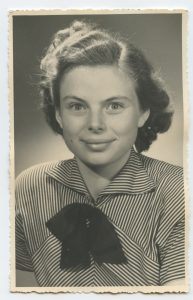 In 1945, Priestley, her mother and her sister made it back to Berlin, where they found their home in ruins but their grandparents’ apartment in the American-occupied section of the city miraculously intact. Though the war in Europe was over, the horrors did not cease. The Berlin blockade and subsequent rationing meant the family was constantly near starving, and the bad news kept coming; they learned Eva’s father had been killed in action, and the newspapers began to report on the concentration camps and the slaughter of the Jewish people.
In 1945, Priestley, her mother and her sister made it back to Berlin, where they found their home in ruins but their grandparents’ apartment in the American-occupied section of the city miraculously intact. Though the war in Europe was over, the horrors did not cease. The Berlin blockade and subsequent rationing meant the family was constantly near starving, and the bad news kept coming; they learned Eva’s father had been killed in action, and the newspapers began to report on the concentration camps and the slaughter of the Jewish people.
“It was so hard to believe,” she says. “We truly had no idea it was happening, and all we could think was, ‘How could this have happened? Why didn’t we notice?’”
Eva soon met Tom Priestley, an American stationed in Berlin. They were married in 1954, and she moved with him to South Jersey. In the ’90s, she began taking creative writing classes and sending stories to newspapers and magazines.
She’s published more than 75 pieces and three books about coming of age in World War II Berlin and coming to America as a young bride. She first set out to preserve her memories for her children and grandchildren, but she hopes the books will serve as a warning against allowing history to repeat itself.
“Now I just think, ‘How stupid to have wars,’” she says. “Nobody wins.”

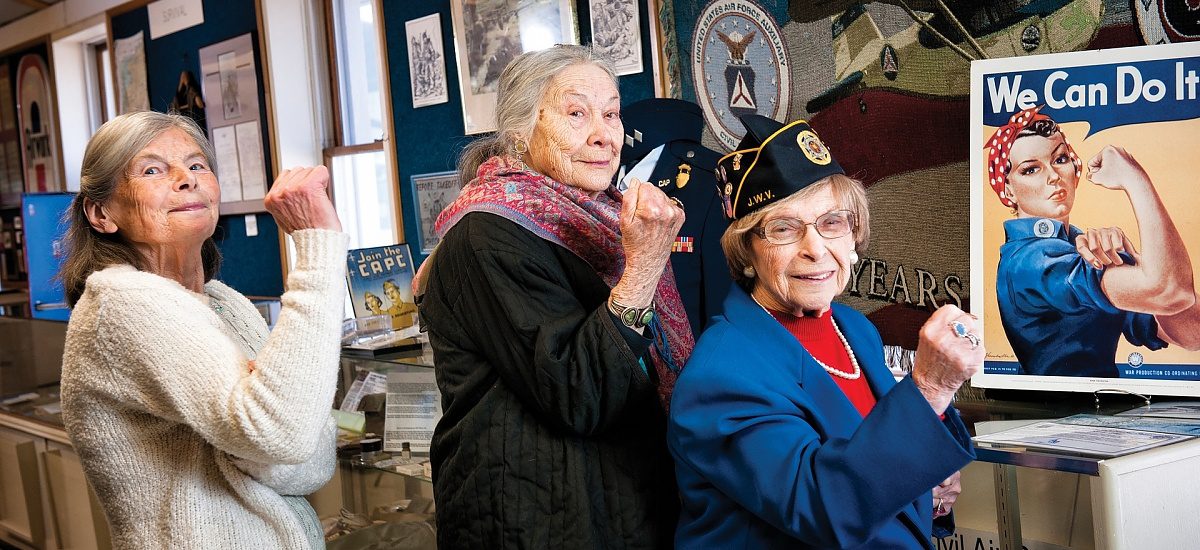
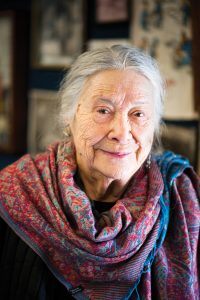 Pat Witt, 89
Pat Witt, 89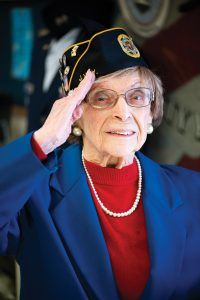 May Brill, 91
May Brill, 91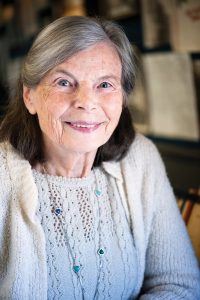 Eva Priestley, 84
Eva Priestley, 84
